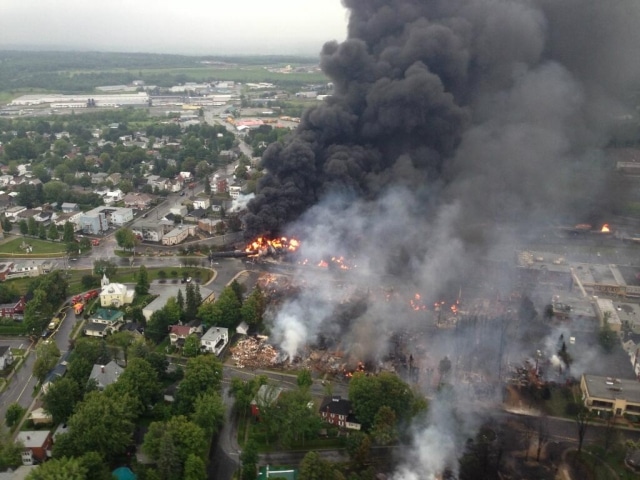Since the first major oil-by-rail explosion occurred on July 6, 2013, in Lac-Mégantic, Quebec, citizens in communities across the U.S. have risen up when they’ve learned their communities are destinations for volatile oil obtained from hydraulic fracturing (“fracking”) in North Dakota’s Bakken Shale basin.
As the old adage goes, ignorance is bliss. It’s also one of the keys to how massive oil-by-rail infrastructure was built in just a few short years — the public simply didn’t know about it.
Often, oil companies are only required to get state-level air quality permits to open a new oil-by-rail facility.
Terry Wechsler, an environmental attorney in Washington, recently explained to Reuters why there was no opposition to the first three oil-by-rail facilities in the area.
“There was no opposition to the other three proposals only because we weren’t aware they were in formal permitting,” he said
The same thing unfolded in Albany, N.Y., where there is an ongoing battle over expansion of the major oil-by-rail facility set to process tar sands crude sent by rail from Alberta. The initial permits for the oil rail transfer facility, which would allow two companies to bring in billions of gallons of oil a year, were approved with no public comment.
Oil and rail companies know well that they can proceed with their planned expansions more easily if communities remain unaware of their plans.
And now that some states — including North Dakota — have defied their efforts to keep the public in the dark about the crude-carrying trains, the public will have a much clearer idea of what’s going on.
A case in point, DeSmogBlog recently revealed crude-by-rail giant Burlington Northern Santa Fe (BNSF) moves up to 45 trains a week in some North Dakota counties and up to three dozen in others.
Big Rail’s Big Bluff
The rail industry has enjoyed a long history of legal protections, allowing it to operate in secrecy with regards to carrying hazardous materials. Indeed, Big Rail pushed hard to fight the release of information to the public on the transportation of Bakken crude oil.
This time around, the rail industry said that information it was compelled to give the federal government on its Bakken oil shipments under the U.S. Department of Transportation’s (DOT) May 7 Emergency Order could not be released to the public under state-level open records laws.
Why? Because it fell under the category of “sensitive security information.”
In boilerplate letters and contract proposals sent to heads of State Emergency Response Commissions — one of which was obtained via Idaho’s Public Records Act by DeSmogBlog — BNSF deployed this argument.
This legal designation means BNSF and other companies could withhold information regarding the movements of Bakken crude from the public — by exempting it from state-level open records laws — and would only have to release it to the emergency response commissions.
“It is important to note that this information is subject to several restrictions on its release and exemptions from both state and federal applicable Freedom of Information laws and should only be provided to persons meeting with the appropriate need-to-knows discussed below,” BNSF wrote in its boilerplate letter.
“BNSF considers this information commercial confidential and business confidential information and Security Sensitive Information pursuant to Federal law, and the documents have been marked accordingly.”
But despite BNSF’s legal claims, some states have released this information in response to open records requests. And the federal government has also leaned toward advocating for greater transparency.
The U.S. Transportation Security Administration (TSA) confirmed by e-mail to the Sacramento Bee that the administration did not consider this information “security sensitive,” stating, “TSA has not made a finding as to whether or not information concerning the volume of crude oil train traffic or the routes used by these trains is considered security-sensitive information.”
The Federal Railroad Administration also concluded information about Bakken crude was not considered sensitive security information.
Community’s Right to Know
The U.S. Environmental Protection Agency’s website contains a section on right to know laws. That section opens by stating, “Every American has the right to know the chemicals to which they may be exposed in their daily living.”
In the case of the ongoing battle occurring between states, the federal government and the rail industry, though, the battle lines have been drawn between “right to know” laws and “need to know” laws.
When it comes to Bakken crude oil, the rail industry’s position is clear: the public has no “need to know” anything.
Rail safety consultant Fred Millar told DeSmogBlog he expects the oil industry to increase attempts to keep information secret. He cautioned against seeing this latest development of some information being released to the public as a win for the public’s right to know.
“It should not be regarded as any kind of a great of victory at this point,” Millar said, “The main thing that they are not doing is giving the local emergency responders and local communities worst-case scenario information about what could actually happen.”
While the release of some records is a first step in the right direction for transparency advocates, some states are still holding out on forking over records so the pendulum is only slowly swinging in the direction of the public interest.
And as the Lac-Mégantic disaster made clear, sometimes transparency for oil-by-rail comes in the worst possible form: a surprise lethal “bomb train” entering your community on a beautiful summer day.
Photo: Lac Megantic train explosion, Wikimedia Commons
Subscribe to our newsletter
Stay up to date with DeSmog news and alerts







